第二十一讲 名词性从句的翻译1
名词性从句的翻译

2) 以it作形式宾语的宾语从句 一般按原句顺序翻译,it可不译出
I
made it clear to them that they must hand in their papers before 10 o’clock in the morning. 我明确地告诉他们,论文必须在上午十点之 前交。 Anyhow, old chap, I owe it to you that I am here. 不管怎么说,老伙计,我现在还能站在这儿, 全靠你。
2) 译为类似定语的结构或独立句
But
I knew I couldn’t trust him. There was the possibility that he was a political swindler. 但我知道不能轻信他。他是政治骗子这 种可能性还是存在的。 It does not alter the fact that he is the man responsible for the delay. 迟延应由他负责,这个事实是改变不了 的。
同位语从句
保持原本的语序 译为类似定语的结构或独成一句 加入冒号、破折号和“这样”、
“这一”、“即”等字眼 改变原文的同位语结构,用汉语 的无主句或其他方式译出
1) 保持原本的语序
He
expressed the hope that he would come over to visit China again. 他表示希望能再来中国访问。 As an obedient son, he had accepted his father’s decision that he was to be a doctor, though the prospect didn’t interest him at all. 作为一个孝顺儿子,他接受了父亲的决 定,去当医生,虽然他对这样的前途毫 无兴趣可言。
名词性从句的翻译
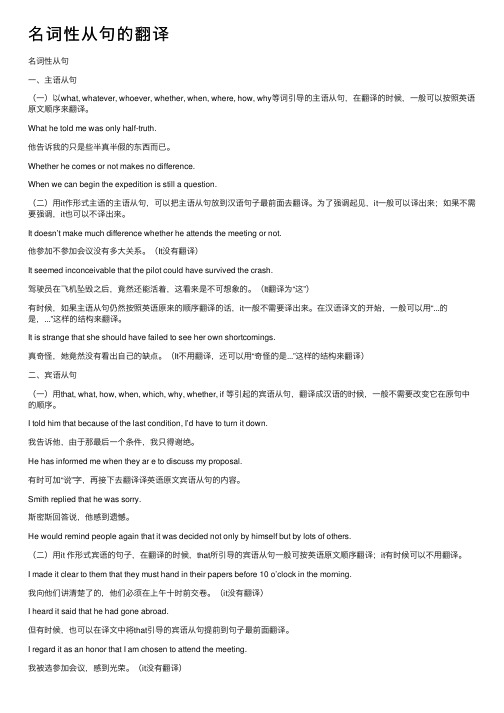
名词性从句的翻译名词性从句⼀、主语从句(⼀)以what, whatever, whoever, whether, when, where, how, why等词引导的主语从句,在翻译的时候,⼀般可以按照英语原⽂顺序来翻译。
What he told me was only half-truth.他告诉我的只是些半真半假的东西⽽已。
Whether he comes or not makes no difference.When we can begin the expedition is still a question.(⼆)⽤it作形式主语的主语从句,可以把主语从句放到汉语句⼦最前⾯去翻译。
为了强调起见,it⼀般可以译出来;如果不需要强调,it也可以不译出来。
It doesn’t make much difference whether he attends the meeting or not.他参加不参加会议没有多⼤关系。
(It没有翻译)It seemed inconceivable that the pilot could have survived the crash.驾驶员在飞机坠毁之后,竟然还能活着,这看来是不可想象的。
(It翻译为“这”)有时候,如果主语从句仍然按照英语原来的顺序翻译的话,it⼀般不需要译出来。
在汉语译⽂的开始,⼀般可以⽤“...的是,...”这样的结构来翻译。
It is strange that she should have failed to see her own shortcomings.真奇怪,她竟然没有看出⾃⼰的缺点。
(It不⽤翻译,还可以⽤“奇怪的是...”这样的结构来翻译)⼆、宾语从句(⼀)⽤that, what, how, when, which, why, whether, if 等引起的宾语从句,翻译成汉语的时候,⼀般不需要改变它在原句中的顺序。
第二十一讲 名词性从句的翻译1

38. Through many years’ practice of teaching foreign language, I have derived a new experience that translation is the best possible approach to studying English. --通过多年的外语教学经验,我获得了一条新经验:翻 译是学习英语的最好办法。
要打破“金要足赤”的形而上学的错误思想。
翻译 HY
C.把同位语译成独立的句子,在其前加“即”,或在名 词之后用冒号或破折号引出同位语从句。
37. We are familiar with the idea that all matter consists of atoms. --我们都熟悉这样一个概念,即一切物质均由原子组成。
翻译 HY
39.They marvel at the fact China did it all on its own.
他们对这个事实感到十分惊讶——所有一切都是中国 凭自己的力量完成的。 40. He was allowed to go climbing on condition that he kept near his teachers and classmates.
翻译 HY
III. 表语从句的译法
一般情况可以按原文译出。
26. That’s what we should do.
这正是我们的本分 27. The question which worries everyone today is: how long will these fuels last? 今天人人都担心的问题是:这些燃料能维持多久?
翻译 HY
名词性从句的翻译
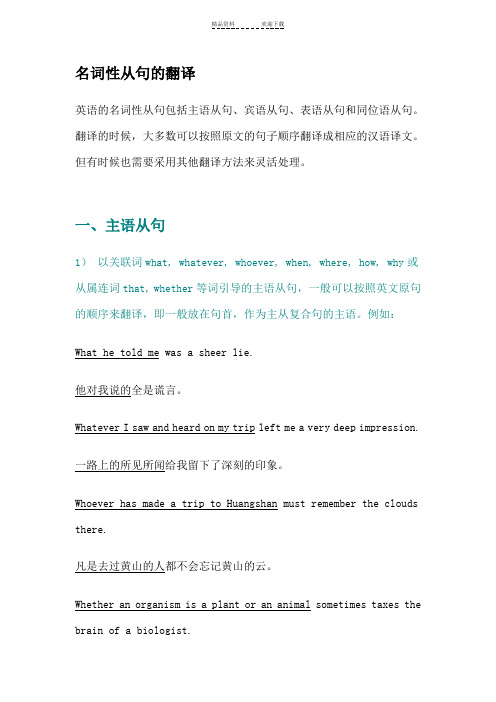
名词性从句的翻译英语的名词性从句包括主语从句、宾语从句、表语从句和同位语从句。
翻译的时候,大多数可以按照原文的句子顺序翻译成相应的汉语译文。
但有时候也需要采用其他翻译方法来灵活处理。
一、主语从句1)以关联词what, whatever, whoever, when, where, how, why或从属连词that, whether等词引导的主语从句,一般可以按照英文原句的顺序来翻译,即一般放在句首,作为主从复合句的主语。
例如:What he told me was a sheer lie.他对我说的全是谎言。
Whatever I saw and heard on my trip left me a very deep impression.一路上的所见所闻给我留下了深刻的印象。
Whoever has made a trip to Huangshan must remember the clouds there.凡是去过黄山的人都不会忘记黄山的云。
Whether an organism is a plant or an animal sometimes taxes the brain of a biologist.一种生物究竟是植物还是动物,有时会让生物学家颇伤脑筋。
2) 对于it作形式主语的主语从句,可以先译主句,顺译为无人称句。
有时也可先译从句,再译主句,这样的话,一般需要在主句前加译“这”。
需要注意的是,如果强调it,可以将其译出;如果不需要强调,也可不译。
例如:It is strange that she should have failed to see her own shortcomings.真奇怪,她竟然看不出自己的缺点。
It seemed incredible that she should have lied to us.她居然对我们说谎,这真是不可思议。
It doesn’t make much difference to me whether you come or not.你来不来我不在乎。
英语名词性从句的翻译
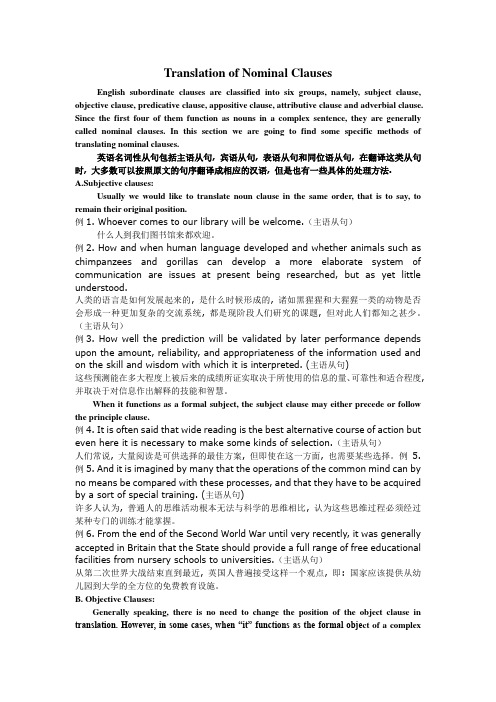
Translation of Nominal ClausesEnglish subordinate clauses are classified into six groups, namely, subject clause, objective clause, predicative clause, appositive clause, attributive clause and adverbial clause. Since the first four of them function as nouns in a complex sentence, they are generally called nominal clauses. In this section we are going to find some specific methods of translating nominal clauses.英语名词性从句包括主语从句, 宾语从句, 表语从句和同位语从句, 在翻译这类从句时, 大多数可以按照原文的句序翻译成相应的汉语, 但是也有一些具体的处理方法.A.Subjective clauses:Usually we would like to translate noun clause in the same order, that is to say, to remain their original position.例1. Whoever comes to our library will be welcome.(主语从句)什么人到我们图书馆来都欢迎。
例2. How and when human language developed and whether animals such as chimpanzees and gorillas can develop a more elaborate system of communication are issues at present being researched, but as yet little understood.人类的语言是如何发展起来的, 是什么时候形成的, 诸如黑猩猩和大猩猩一类的动物是否会形成一种更加复杂的交流系统, 都是现阶段人们研究的课题, 但对此人们都知之甚少。
名词性从句翻译
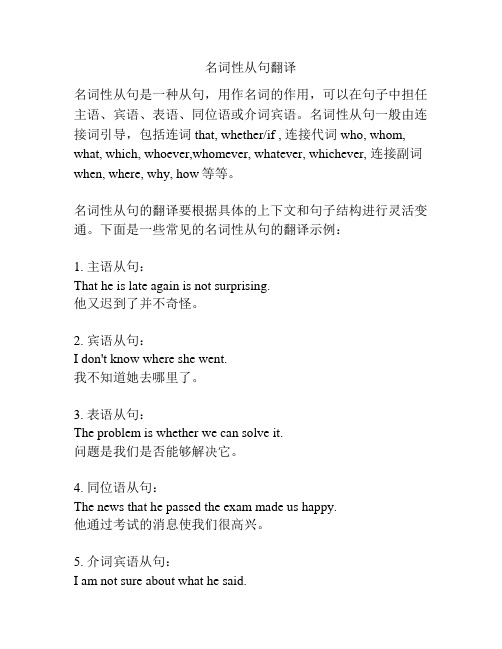
名词性从句翻译名词性从句是一种从句,用作名词的作用,可以在句子中担任主语、宾语、表语、同位语或介词宾语。
名词性从句一般由连接词引导,包括连词that, whether/if , 连接代词who, whom, what, which, whoever,whomever, whatever, whichever, 连接副词when, where, why, how等等。
名词性从句的翻译要根据具体的上下文和句子结构进行灵活变通。
下面是一些常见的名词性从句的翻译示例:1. 主语从句:That he is late again is not surprising.他又迟到了并不奇怪。
2. 宾语从句:I don't know where she went.我不知道她去哪里了。
3. 表语从句:The problem is whether we can solve it.问题是我们是否能够解决它。
4. 同位语从句:The news that he passed the exam made us happy.他通过考试的消息使我们很高兴。
5. 介词宾语从句:I am not sure about what he said.我不确定他说的是什么。
6. 间接引导名词性从句:He asked where I lived.他问我住在哪里。
7. 是否从句:I wonder whether/if she will come to the party.我想知道她是否会来参加派对。
8. 选择性从句:He asked me whether I preferred coffee or tea.他问我是喜欢咖啡还是茶。
9. 宾语从句(陈述句变为疑问句):Do you know what time it is?你知道现在几点钟吗?10. 宾语从句(连接代词):I wonder who is going to pick us up at the airport.我想知道谁会在机场接我们。
名词性从句翻译句子
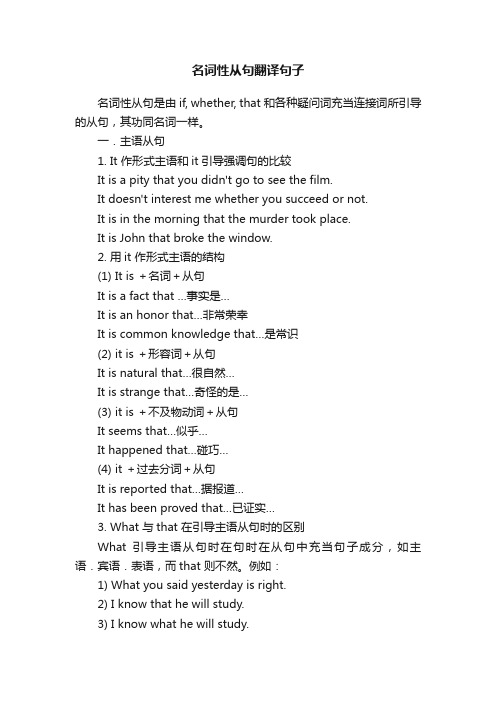
名词性从句翻译句子名词性从句是由if, whether, that 和各种疑问词充当连接词所引导的从句,其功同名词一样。
一.主语从句1. It 作形式主语和it引导强调句的比较It is a pity that you didn't go to see the film.It doesn't interest me whether you succeed or not.It is in the morning that the murder took place.It is John that broke the window.2. 用it 作形式主语的结构(1) It is +名词+从句It is a fact that …事实是…It is an honor that…非常荣幸It is common knowledge that…是常识(2) it is +形容词+从句It is natural that…很自然…It is str ange that…奇怪的是…(3) it is +不及物动词+从句It seems that…似乎…It happened that…碰巧…(4) it +过去分词+从句It is reported that…据报道…It has been proved that…已证实…3. What 与that 在引导主语从句时的区别What 引导主语从句时在句时在从句中充当句子成分,如主语.宾语.表语,而that 则不然。
例如:1) What you said yesterday is right.2) I know that he will study.3) I know what he will study.4) That he works hard is known to us all.5) What he works hard at is known to us all.4. 连接副词引导Where he lives is unknown to me.How the book will sell depends on its author.Why they kill ed the man hasn’t been made clear yet.二.宾语从句宾语从句就是在复合句中作宾语的名词性从句,通常放在主句谓语动词(及物动词)或介词之后。
英语名词性从句讲解【完整版】

2、I asked him if he could do me a favor .
If与whether的区别:
1、If不能引导放于句首的主语从句,而whether可以。 2、引导表语从句用whether,不用if。 3、引导同位语从句用whether,不用if。 4、whether可以引导从句作介词的宾语,不用if 。 5、whether or not 连在一起可以,但if不可以。而 “whether-----or not = if -----or not”
同位语从句:
定义:在复合句中充当同位语的句子。 同位语从句用来对其前面的抽象名词进行解释说明,被解释说明的词和 同位语在逻辑上是主表关系。 同位语常见名词:fact, suggestion, advice, idea, decision, news, thought, hope, belief, truth, doubt, promise, possibility, truth, warning, message, reason, report, question,explanation, wish, problem等。 常见的连接词:that, whether, what, who, how, when, where等。 用法: The thought that I want to buy my mother a birthday gift makes me excited.that 引导的同位语从句,解释说明 thought,从句不缺成 分 There is some doubt whether he will come. whether 引导同位语从句,if 不能引导同位语从句 we haven’t made the decision where we are going to spend our vacation. 有时同位语从句可以不紧跟解释说明的名词后面。 The news is surprising that he won the match.
高考中译英名词性从句翻译 1

1. 这个男孩的言行不一。
(contrary)答案What the boy does is often contrary to what he says.解析这里考查的是由what引导的主语从句和宾语从句;注意词组“与……相悖” be contrary to。
2. 学生们逐渐认识到友谊胜过金钱才是真朋友。
(realize)答案The students have come to realize (that)friendship is more important than money and that a friend in need is a friend indeed.解析这里考查的是由that引导的宾语从句。
需特别注意,当动词后跟随两个或两个以上宾语从句时,第一个从句的引导词that可以省略,从第二个从句起,引导词that不可以省。
3. 一本书是否畅销取决于诸多因素。
(whether)答案Whether a book sells well depends on many / various factors解析这里考查whether引导的主语从句,在一般现在时中,主语从句视为第三人称单数,谓语动词要用单三形式;“取决于”depend on 近义词组还有lie on rely on等。
4. 令我高兴的是我被梦寐以求的复旦大学录取了。
(admit dream)答案What makes me happy is that I was admitted to Fudan University which I dreamed of.解析这里考查的是what引导的主语从句和由that引导的表语从句,同时又考查了非限制性定语从句,一定要分清楚他们之间的不同特点和用法;还要注意固定表达be admitted to“被……录取”,以及“梦想中的,梦寐以求的”dream of.5. 问题是父母们太关注孩子的分数而忽略了他德智体的发展。
名词性从句的翻译

(2)When subject clauses introduced by it used as a formal subject are translated, it doesn’t matter whether they are put in front of the sentence or not. ―it‖ can or cannot be translated. e.g. It doesn’t make much difference whether he attends the meeting or not. (―it‖ hasn’t been translated)
他参不参加会议都没关系。
It was obvious that I had become the pawn in some sort of top level power play.
很清楚,某些高级人物在玩弄权术,而我却成了他们的工具。
It seemed inconceivable that the pilot could have survived the crash. (―it‖ has been translated)
作为一个孝顺的儿子,我接受了父亲的决定,要当医生,虽然我对 这样的前途毫无兴趣。
We demanded a guarantee that no similar incident would occur again.
我们要求保证不再发生类似事件。
(2)in front of the sentence It does not alter the fact that he is the man responsible for the delay. 延迟应由他负责,这个事实是改变不了的。 Yet, from the beginning, that fact that I was alive was ignored. 然而,从一开始,我仍然活着这个事实却偏偏被忽视了。
名词性从句的译法
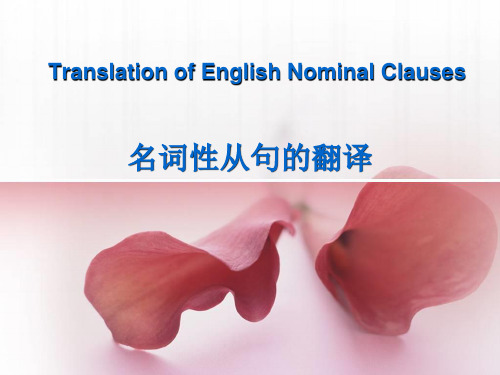
例4:Whatever he saw and heard on his trip gave him a very deep impression. 【译文】他此行所见所闻都给他留下了深刻的印象。 例5:Since hearing her predicament, I’ve always arranged to meet people where they or I can be reached in case of delay. 【译文】听她说了那次尴尬的经历之后,每每与人约 见,我总要安排在彼此能够互相联系的上的地 方,以免误约。
从句)
【译文】物质是由粒子组成的,这些粒子在一些物 态中要比在另一些物态中更易于运动。 根据上 述理论,我们可以简要地阐明固体、液体和气 体之间的主要差别。
补充例句:名词性从句 例7.It is flattering to believe that they (ideas) are too profound to be expressed so clearly that all who run may read, and very naturally it does not occur to such writers that the fault is with their own minds which have not the faculty of precise reflection. 【译文】认为自己的思想深奥,不可能表达得很清 楚,让任何人都能理解,这是一种虚荣的念头。 这样的作家当然不会想到,问题还是出在自己 脑子缺乏精确思考的能力。来自2 名词性从句译成定语从句
名词性从句的译法

目 录
• 名词性从句的概述 • 名词性从句的翻译技巧 • 名词性从句在句子中的位置和功能 • 名词性从句的特殊译法 • 名词性从句在汉译英中的应用
01
名词性从句的概述
定义与分类
定义
名词性从句是句子在复合句中充当名 词成分,包括主语、宾语、表语和同 位语等。
分类
根据功能和意义,名词性从句可以分 为陈述性从句、疑问性从句和祈使性 从句。
主语从句
主语从句在句子中充当主语,表达句子 的核心信息。
在翻译时,通常将主语从句放在句首,以突 出其重要性。
例如:When he comes back is unknown. 他什么时候回来还不知 道。(主语从句翻译为“什么时候 他回来还不知道”)
宾语从句
01
宾语从句在句子中充当宾语,对句子的主语进行补 充说明。
详细描述
合句法是指将多个简单句合并成一个长句,使译文更加 紧凑、连贯。这种方法通常用于翻译多个简单句构成的 长句,如“She is beautiful, and that is why he likes her.”可合句译为“她很漂亮,这就是他喜欢她的原因。 ”
03
名词性从句在句子中的 位置和功能
要点二
详细描述
分句法是指将复杂的名词性从句拆分成多个简单句,使译 文更加清晰、易于理解。这种方法通常用于翻译包含多个 从句或修饰语的名词性从句,如“What I like is the way she talks.”可分句译为“我喜欢的是她说话的方式。”
合句法
总结词
将多个简单句合并成一个长句,增强整体感。
在翻译过程中,要保持原文的语义完整性和通顺度,避免出现歧义和语病。同时,要注意符合目标语 言的表达习惯和规范。
名词性从句翻译ppt课件
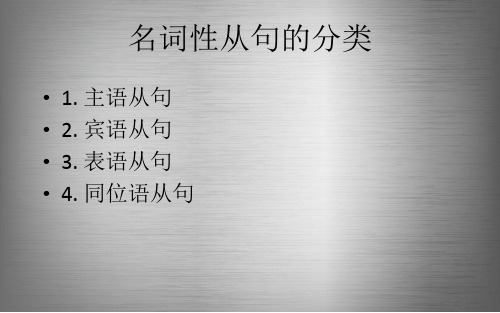
表语从句
• 引导表语从句的连词与引导主语从句的连 词相同。表语从句一般采用顺译法,即先 译主语后译从句。
Example
• The trouble was they couldn’t agree among themselves.
• 问题是他们内部意见都不能统一。
• 他将辞职的传言是假的。
• It does not alter the fact that he was responsible for the delay.
• 迟延应由他负责,这个事实是改变不了的。
• 3. 转换译法。
• 被同位语所说明的本位语,如若是包含着有动作 意义的词,如discovery, suggestion, hope, assurance, knowledge等,一般可把这类词转化为 动词,将同位语从句译为汉语的主谓词组,做该 动词的宾语。
• 近来谁也没有见过他,这一情况令办公室 所有的人不安。
• That he is still alive is sheer luck. • 他还活着全靠运气。
• It is quite clear that the whole project is doomed to failure.
• 很清楚,整个计划注定要失败。
增加泛指性词语作主语
• It is admitted that • It is asserted that • It is believed that • It is found out that • It is known that • It is pointed that • It is regarded that • It is suggested that • It is thought that
名词性从句讲解(最全版)
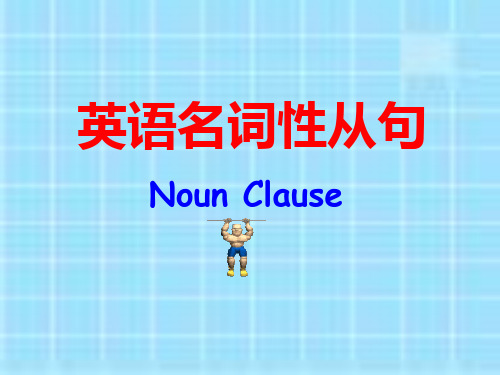
连接副词(4个):when、 why、 where、 how
名词性从句讲解(最全版)
名词性从句引导词的用法(1):
从句中的每一个引导词都有3个功能,分别如下:
“that”---无词义、不作成份、起连接作用
从属连词
“if”--- “是否”、不作成份、起连接作用
“whether”---“是否”、不作成份、起连接作 用
名词性从句讲解(最全版)
“that”---无词义、不作成份、起连接作用
1、That we will realize our dreams in the future is
连接代词
“whoever”-- “-----的任何人”、作主语、 “whomever”-- “-----的任何人”、作宾语、 “whatever”-- “----的任何东西”、作主表宾语、 “whichever”--- “无论哪个或哪些---”、作定语、
名词性从句讲解(最全版)
“whoever”-- “---的任何人”、作主语、起连接作用
(表语从句)
3、They agree with what I said just now .
(宾语从句)
名词性从句讲解(最全版)
“which”---“哪---”、作定语、起连接作用
1、Which class is suitable for us isn’t most
important .
(主语从句)
(主语从句)
2、The trouble is who could lend me some money .
翻译4.5:名词性从句的翻译
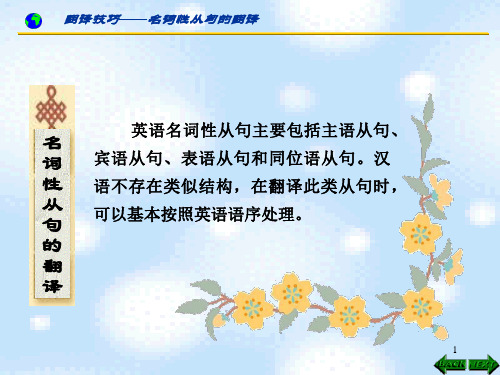
3) Your abilities count, but the belief that you can succeed affects whether or not you will.
你的能力固然很重要,但是相信自己会成功的信念将影响你能 否获得成功。
18
翻译技巧——4. 同位语从句的翻译
增加“即”或“那就是”,或用冒号、破折号分 开。 1) This reinforced the idea that anyld do anything I wanted.
青少年现在购物更多了,这就会使他们在光顾的商店里花钱多。
2) That aspect has to be weighed against the fact that they might not help your career plans.
但这些工作可能无助于你的择业规划,你必须在这两个方面权 衡一下。
discussions.
教授们和女生都发现,男孩子正在逐渐“接管”课堂讨论。
9
翻译技巧——1. 主语从句的翻译
3) It is imagined by many that the operations of the common mind can by no means be compared with these processes.
这进一步增强了我的想法:世上无难事,只要我想要做的事, 我都能够做到。
are lighter in water than they are in air.
物体在水中比在空气中轻,这是一种常识。
6
翻译技巧——1. 主语从句的翻译
也可以变换顺序,翻译时主语从句置于句后: 1) It is obvious that such uncomfortable feelings must affect people adversely.
名词性从句的翻译

“It is + 形容词+that 从句”
译法:先将“that从句”单独翻译出来,然后加上 “(这是)很+形容词”的结构。 有时将形容词转译成副词短语,会使译文更符合汉语 的表达习惯。
1.It was really astonishing that she refused to talk to her parents. A.她拒绝和父母交谈,这真令人吃惊。 B. 我们很可能要迟到一会儿。 2. It is strange that he should have failed to see his own shortcomings. A. 他竟然没有看出自己的缺点,这很奇怪。 B. 真奇怪,他竟然没有看出自己的缺点。
Translation of Nominal Clauses
I. Translation of Subject Clauses II. Translation of Object Clauses
III. Translation of Predicative Clauses
IV. Translation of Appositive clauses
(三)Convert into an object clause and put it after the noun.
There are clear indications that the war will soon be over. 有明显的迹象表明战争即将结束。
(四) Use punctuation marks or specific words
麻烦的是他们缺钱。 3.This is where the shoe pinches. 这就是问题的症结所在了。
IV. Appositive clauses
名词性从句的翻译
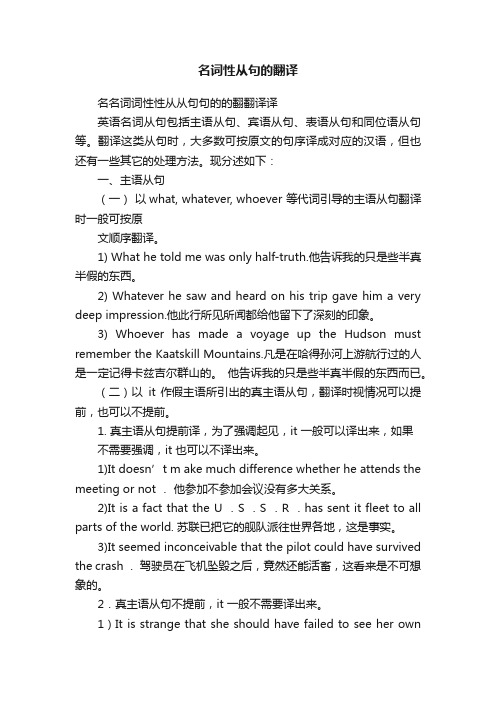
名词性从句的翻译名名词词性性从从句句的的翻翻译译英语名词从句包括主语从句、宾语从句、表语从句和同位语从句等。
翻译这类从句时,大多数可按原文的句序译成对应的汉语,但也还有一些其它的处理方法。
现分述如下:一、主语从句(一)以what, whatever, whoever 等代词引导的主语从句翻译时一般可按原文顺序翻译。
1) What he told me was only half-truth.他告诉我的只是些半真半假的东西。
2) Whatever he saw and heard on his trip gave him a very deep impression.他此行所见所闻都给他留下了深刻的印象。
3) Whoever has made a voyage up the Hudson must remember the Kaatskill Mountains.凡是在哈得孙河上游航行过的人是一定记得卡兹吉尔群山的。
他告诉我的只是些半真半假的东西而已。
(二)以it 作假主语所引出的真主语从句,翻译时视情况可以提前,也可以不提前。
1. 真主语从句提前译,为了强调起见,it 一般可以译出来,如果不需要强调,it 也可以不译出来。
1)It doesn’t m ake much difference whether he attends the meeting or not .他参加不参加会议没有多大关系。
2)It is a fact that the U .S .S .R .has sent it fleet to all parts of the world. 苏联已把它的舰队派往世界各地,这是事实。
3)It seemed inconceivable that the pilot could have survived the crash .驾驶员在飞机坠毁之后,竟然还能活畜,这看来是不可想象的。
2.真主语从句不提前,it 一般不需要译出来。
英译汉——名词性从句的译法

考研英语每日一课(英译汉——名词性从句的译法)英译汉——名词性从句的译法英语名词性从句包括主语从句,宾语从句, 表语从句和同位语从句, 在翻译这类从句时, 大多数可以按照原文的句序翻译成相应的汉语,但是也有一些具体的处理方法,下面我们结合一些实例加以说明:例1.How andwhenhuman lang uagedevel opedand w hethe r ani malssuchasch impan zeesand g orill as ca n dev elopa mor e ela borat e sys tem o f com munic ation areissue s atprese nt be ing r esear ched, butas ye t lit tle u nders tood.人类的语言是如何发展起来的, 是什么时候形成的, 诸如黑猩猩和大猩猩一类的动物是否会形成一种更加复杂的交流系统,都是现阶段人们研究的课题, 但对此人们都知之甚少。
(主语从句)例2.How w ell t he pr edict ion w ill b e val idate d bylater perf orman ce de pends upon theamoun t, re liabi lity, andappro priat eness of t he in forma tionusedand o n the skil l andwisd om wi th wh ich i t isinter prete d. (95年考题)这些预测能在多大程度上被后来的成绩所证实取决于所使用的信息的量、可靠性和适合程度,并取决于对信息作出解释的技能和智慧。
《名词性从句翻译》PPT课件
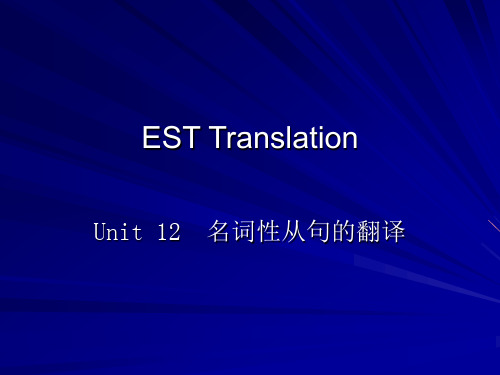
2. 宾语从句
EX1: I told him that I had to turn him down. EX2: Scientists are afraid that one day an even bigger 译ea文rt:hquake will hit the area around San Francisco.
(EEXX许12::建我 科平告 学,诉 家2他 担00我心8不有V2得朝:不一1拒日3绝旧5)他金。山周围地区还会发 E生X更3:大H的e h地as震in。formed me when they are to discuss
mEyX3p:ro他po已sa经l.通知我他们将在什么时候谈论我的建 E议界XE和。E4inX:思4sTt:oe想i为nm界’什so,st么th这ep爱oe对ro因yp大le斯ev多i坦et数ni的tsu人n学a是oll说ty难e最sah以s后oy解o震tko释撼teh清xe了p楚wl整a的hi个no。lw科e h学y
scientific and intellectual world.
2. 宾语从句
EX 5: I made it clear to them that they must hand in their papers before 10 o’clock in the morning.
E译X文6::I leave it to your own judgment whether you E交sXh卷o5。:uld我d向o他it.们讲清楚了的,他们必须在上午十时前 EEXX 76::I 我th让ink你i自t q己ui判te断tru,e这th件at事he该v不en该tu做re。d out to ESXh7a:ng他ri又-la冒. 险去香格里拉了,我觉得这件事千真万 E确EXfXi。n88i::sWh让ehd他aitn们thtw十eyo天.w做er的e a事sk,e他d t们o 两do天in就1做0 完da了ys。, they
- 1、下载文档前请自行甄别文档内容的完整性,平台不提供额外的编辑、内容补充、找答案等附加服务。
- 2、"仅部分预览"的文档,不可在线预览部分如存在完整性等问题,可反馈申请退款(可完整预览的文档不适用该条件!)。
- 3、如文档侵犯您的权益,请联系客服反馈,我们会尽快为您处理(人工客服工作时间:9:00-18:30)。
II.宾语从句的译法
• 普通句型
• 以从属连词、连接代词或介词引起的宾语从句汉译时, 词序一般不变。如:
• I have not made up my mind as to what elective course I am to take next term.
• --我还有决定下学期上哪些选修课。
翻译 HY
• 7. It is quite possible that someday John will come to see you again.
• --总有一天约翰会来找你的,这是很有可能的哦!
• 8. It is frequently the case that his car breaks down on the highway.
翻译 HY
C.把同位语译成独立的句子,在其前加“即”,或在名 词之后用冒号或破折号引出同位语从句。
37. We are familiar with the idea that all matter consists of atoms. --我们都熟悉这样一个概念,即一切物质均由原子组成。
38. Through many years’ practice of teaching foreign language, I have derived a new experience that translation is the best possible approach to studying English. --通过多年的外语教学经验,我获得了一条新经验:翻 译是学习英语的最好办法。
• --可能有人会提出,无线电广播同样能够做到这一 点;但是在电视屏幕上,每个节目都显得更加生动, 更加真实。
• 3. It is well known that alloy is a metal product containing two or more elements.
• --众所周知(大家都知道),合金是一种含有两种 或两种以上元素的金属产品。
• She was never satisfied with what she had achieved. • --她从不满足于她取得的成就。
• Zhang San replied that he was very sorry. • --张三回答说,他感到很遗憾。
翻译 HY
• B. 用it 作形势宾语的句子,汉译时,宾语从句可 按原文译出,但it 可省译。
• 21. I leave it to your own judgment whether you should do it.
• 我让你自己判断,这件事该不该做。 • 22. I made it clear to the students that they must
hand in their assignments before 11 a.m. • 我给学生讲明,他们必须在上午11点前交作业。 • 23. I think it quite true that he ventured out to
翻译 HY
极少数的表语从句也可以按照汉语的表达习惯,把表 语从句提前。
29. That is why the “know-all” is ridiculous.
“万事通”之所以可笑,原因就在于这个地方。
30. That is why she is so happy.
她如此高兴的原因就在这里。
表语从句译法总结:1、在 “that (this) is why”结构中,如先译主句, 后译从句就成了“这就是为什么……” , “ 这就是为什么……的原因 (缘 故)”;如先译从句,后译主句,常译为“ ……的原因(理由)就在这里”。 2、在 “that (it) is because…”句型中,常先译主句,后译从句,成为 “这是因为……”,“这是因为(由于)……的缘故”。3、在“This is what…”结构中,先主后从就译为“这就是……的(内容);若先从后主就 译为“ ……就是这个道理(意思) ”。
• 10.It follows that the Chinese comrades consider Korea’s cause as their own.
• --由此得出,中国同志把朝鲜的事情看成自己 的事情。
• 比较上述各句,联系英汉民族思维差异:英语民 族重直线思维,要点先给出,其他信息再一一增 补;汉语民族重曲线思维,先侧面,外围,后点 出信息的重点。因而,英语(前重心)是头短尾 长,汉语是(后重心),头大尾小。
27. The question which worries everyone today is: how long will these fuels last? 今天人人都担心的问题是:这些燃料能维持多久?
28. “If I have seen farther than other man, it is because I have stood on the shoulders of giants” (Newton) “要说我比别人望得远了一点,那是因为我已经站在了 巨人的肩旁上。”(牛顿)
翻译 HY
单词、短语作同位语的译法
• According to Snyder, my cousin, Oswald mentioned this matter.
• -根据我表兄斯奈德的叙述,奥斯瓦得提到 过这件事。(提前)
• We two like to go there. • 我们两个都想去。
翻译 HY
• --他的车在路上抛锚,这是常有的事儿。
• 9. It is a matter of common experience that bodies are lighter in water than they are in air.
• --物体在水中比在空气中轻,这是一种(大家共有 的)常识。
翻译 HY
• It is reported that the Summit Meeting will be held in December.
• --据报道,这个峰会将在12月举行。
翻译 HY
• 2. It could be argued that the radio performs this service just as well; but on television everything is much more living, much more real.
• 25. What they were asked to do in 10 days, they finished in two.
• 让他们十天内做的事,他们两天就做完了。
翻译 HY
III. 表语从句的译法
一般情况可以按原文译出。
26. That’s what we should do. 这正是我们的本分
• This shows that something unexpected may have turned up.
• --这表明可能出现了意外情况。
翻译 HY
• Lei Feng always thought how he could do more for people.
• --雷锋总是想到怎样为人民做更多的事。
32. Can you produce any evidence that he was not at college that night? 你能不能提出证明,断定那天夜里他不在这儿。
翻译 HY
33. I had no idea that you were here. 我不知道你也在这儿。 B. 同位语从句提前 34. There can be no doubt that she is competent for this job. 她能胜任这项工作,这是毫无疑问的。 36. Do away with the mistaken metaphysical notions that “Gold must be pure.” 要打破“金要足赤”的形而上学的错误思想。
作适当扩充或加破折号、冒号
• Her son, my employer’s nephew, was himself an assistant in the shop.
Shangri-la. • 他又冒险去香格里拉了,我觉得这件事千真万确。
翻译 HY
• B.英语中有时为了修辞强调, 把宾语从句置于 主句前,汉译时 也可遵从该修辞效果,顺序译 出。如:
• 24. Whether they like it or not, I don’t care. • 他们喜不喜欢,我可不管。
翻译 HY
B. “It +谓语(表语)+that”句型
• 这样的主语从句句型可处理为: (1) 先把主句的谓语或表语部分译成独 立语,然后顺译出从句;(2) 颠倒原文句子结构,先译出从句,再译 出主句。如:
• 4. It is strange that she has failed to see his advantages. • --真奇怪,她竟然没有看出他的优点。 • 5. It goes without saying that plants cannot grow without sunshine. • --毋庸置疑,没有阳光,植物就不能生长。 • 6. It is quite obvious that the girl still loves you deeply. • --很明显,这个女孩依然深爱着你。
翻译 HY
39.They marvel at the fact China did it all on its own. 他们对这个事实感到十分惊讶——所有一切都是中国 凭自己的力量完成的。 40. He was allowed to go climbing on condition that he kept near his teachers and classmates. 允许他去爬山的条件是——不能离开老师和同学。
